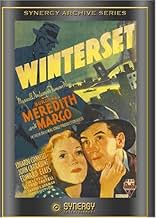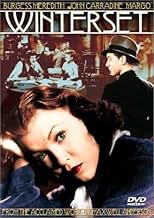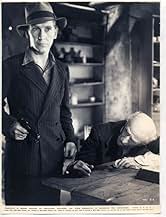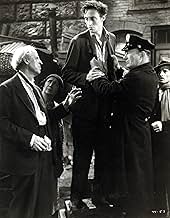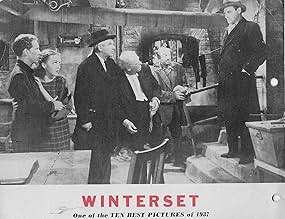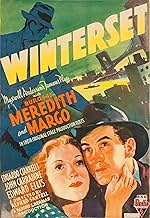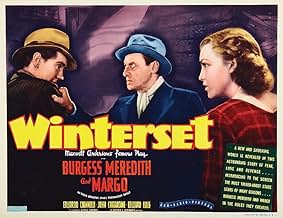Agrega una trama en tu idiomaImmigrant radical Bartolomeo Romagna is falsely condemned and executed for a payroll robbery. Years later, his son Mio sets out to find the truth of the crime and to bring to account the gan... Leer todoImmigrant radical Bartolomeo Romagna is falsely condemned and executed for a payroll robbery. Years later, his son Mio sets out to find the truth of the crime and to bring to account the gangster Trock Estrella.Immigrant radical Bartolomeo Romagna is falsely condemned and executed for a payroll robbery. Years later, his son Mio sets out to find the truth of the crime and to bring to account the gangster Trock Estrella.
- Dirección
- Guionistas
- Elenco
- Nominado a 2 premios Óscar
- 4 premios ganados y 4 nominaciones en total
Murray Alper
- Louie
- (sin créditos)
- Dirección
- Guionistas
- Todo el elenco y el equipo
- Producción, taquilla y más en IMDbPro
Opiniones destacadas
I thought Burgess Meredith turned in quite a characterful performance in this otherwise rather dry drama. He is "Mio" whose late father we have already seen at the top of the film being condemned to the chair for his part in a robbery. Now, a generation later he is determined to prove that he was innocent. What quickly becomes apparent is that the investigation at the time was largely based around the "if your face fits" theory, and it doesn't take "Mio" very long to get onto the trail of a far more likely culprit. Meantime, we also discover that a speech made by his dad upon sentencing declaring his innocence and warning the judge that his will be a sort of living death from now on has turned out to be eerily true. That judge (Edward Ellis) has indeed somewhat lost the plot, and is a ghost of his former self wandering the streets with little memory of who he is or was. It might well be that "Mio" could be in a position to salvage more than one should here? The plot clearly seeks to highlight the difficulties for the poverty stricken, slum-dwelling, population of the USA to not just get by in life, but to get a fair hearing from authority. That's not just the court proceedings, but also far more rudimentary aspects of freedom. Even an assembly to dance attracts the police. Ultimately, though, it really does come down to a straightforward style of good and evil, and with the underplayed but effectively sinister effort from Eduardo Ciannelli and a really quite impactful one from Ellis, this can at times be quite a poignant evaluation. Alfred Santelli hasn't done so much to creatively adapt it from the stage though, and that straight transfer to celluloid sees it lose quite a bit of it's intensity. Even with the romantic attachment to "Miriamne" (Margo), much of the intimacy is gone, the dialogue is all too often delivered as if it were set-piece monologues, and none of the characters really come together until very near the end. Just taking it from the theatre to the cinema was always going to compromise some of the nuance, and though this is still a decent effort it just misses a little of the story's soul.
The chance to see Broadway players recreate their performances on film back in the day should never be missed. Burgess Meredith, Margo, and Eduardo Ciannelli recreate their stage roles from Winterset in this 1936 film. But the story itself is horribly dated, mostly with a lot of left wing rhetoric which gets in the way of the plot.
Probably back in 1936 no one cared as the cause of Sacco&Vanzetti was still fresh in everyone's mind. Today it is still debated by historians and legal scholars and the two working class Italian-Americans are still venerated in Italian-American households of a more liberal persuasion in their politics. But the average American today knows the case vaguely if at all today.
The men went to the electric chair in Massachusetts protesting their innocence as does John Carradine in this film. Before Carradine dies he imparts a sense of mission to his son who grows up to be Burgess Meredith to find the real guilty parties.
A review of the case by a law school class saying that the state electrocuted the wrong man brings new attention to the case, not something that Eduardo Ciannelli likes. He was the real trigger man in the case and now he's a big shot gangster.
Rather improbable events bring Meredith, Ciannelli, the judge Edward Ellis now a drunken derelict, Paul Guilfoyle another accomplice, Guilfoyle's father Maurice Moscovitch and his sister Margo all together on a rainy and stormy night.
Maxwell Anderson wrote the original play and I have to contrast it with another of his plays that made it to the screen, Key Largo. It was another film where various folks are trapped in a storm and interesting things happen. Winterset never really sheds its stage origins and can't shake the rhetoric. Contrast that to Key Largo which never loses your interest for a second and while most of the action takes place in a closed down out of season hotel where the cast is holed up you never get any sense of staginess in it. The rhetoric is there, but it never gets in the way of the story as in Winterset.
Even with Oscar nominations for Art Direction and Musical scoring Winterset is a relic of bygone days.
Probably back in 1936 no one cared as the cause of Sacco&Vanzetti was still fresh in everyone's mind. Today it is still debated by historians and legal scholars and the two working class Italian-Americans are still venerated in Italian-American households of a more liberal persuasion in their politics. But the average American today knows the case vaguely if at all today.
The men went to the electric chair in Massachusetts protesting their innocence as does John Carradine in this film. Before Carradine dies he imparts a sense of mission to his son who grows up to be Burgess Meredith to find the real guilty parties.
A review of the case by a law school class saying that the state electrocuted the wrong man brings new attention to the case, not something that Eduardo Ciannelli likes. He was the real trigger man in the case and now he's a big shot gangster.
Rather improbable events bring Meredith, Ciannelli, the judge Edward Ellis now a drunken derelict, Paul Guilfoyle another accomplice, Guilfoyle's father Maurice Moscovitch and his sister Margo all together on a rainy and stormy night.
Maxwell Anderson wrote the original play and I have to contrast it with another of his plays that made it to the screen, Key Largo. It was another film where various folks are trapped in a storm and interesting things happen. Winterset never really sheds its stage origins and can't shake the rhetoric. Contrast that to Key Largo which never loses your interest for a second and while most of the action takes place in a closed down out of season hotel where the cast is holed up you never get any sense of staginess in it. The rhetoric is there, but it never gets in the way of the story as in Winterset.
Even with Oscar nominations for Art Direction and Musical scoring Winterset is a relic of bygone days.
Despite having read the liner notes, I thought from the publicity artwork that WINTERSET would be something Gothic. It is Gothic, in its bleakness, but is squarely centered in the Depression era of the United States. It was completely of it's time, and considering that the film was adapted from the Broadway play, it must have been daring, with sub themes of socialism and police corruption. (The play was by Maxwell Anderson, who wrote KEY LARGO and THE BAD SEED.) Perhaps that contributed to the film receiving two Academy Award nominations.
This is the story of Mio (Bartholomio a young, dewy Burgess Merideth) trying to clear his father's name. In the first scenes, his namesake Father, played with riveting stillness by the painfully thin John Carradine, was accused of murder he did not commit, given no defense, and put to death. Years later, his son goes to the slums of New York to try to find out the truth.
I had to remind myself that this was made in 1936, so it is still very early in the talkies. The sets are a wonderful blend of realism and expressionism (similar to the famous stage sets of Arthur Miller's A VIEW FROM THE BRIDGE), giving this a Gothic noir flavor. Rain is often used as a "purifier" in stage and film, but here it is effectively used to create an oppressive humidity, a torrent of sludge. It is clear that film noir, Orson Wells, and THE THIRD MAN's Director Carol Reed all owe a debt to early films like this. The set elements are all here in tight proximity, the stone, the shadowed doorways, the waterways.
In fact, one irony is that one of the lead actors does look very much like Orson Wells. He plays the brother of Mariama (played by Margot, who is probably best known as the duplicitous woman in Capra's LOST HORIZON). Margot's transition to film is not as ideal as Merideth's, her style is more of the old school careful vocal production that may be the product of overcoming an accent. But she looks luminous and innocent, and fills the screen with a simple hopefulness at odds with the dark surroundings. The villain of the piece is simply fantastic completely believably sociopathic without any extravagant ticks or frothing at the mouth.
This is pre-method-acting, but that spare realism is all here, especially in the performances of Carradine and Merideth. This entire film holds up as a moment of history of social themes and thought of that day that still resonate. The Broadway cast seems to have been lifted intact (which should be a lesson to modern filmmakers to use stage actors instead of vice-verse). There are one or two flowery monologues, but for the most part, the transition from stage to film goes very well, and the story and script are spare and universal enough to stand the test of time well. This is a fascinating moment of film history which has luckily made its way to DVD.
This is the story of Mio (Bartholomio a young, dewy Burgess Merideth) trying to clear his father's name. In the first scenes, his namesake Father, played with riveting stillness by the painfully thin John Carradine, was accused of murder he did not commit, given no defense, and put to death. Years later, his son goes to the slums of New York to try to find out the truth.
I had to remind myself that this was made in 1936, so it is still very early in the talkies. The sets are a wonderful blend of realism and expressionism (similar to the famous stage sets of Arthur Miller's A VIEW FROM THE BRIDGE), giving this a Gothic noir flavor. Rain is often used as a "purifier" in stage and film, but here it is effectively used to create an oppressive humidity, a torrent of sludge. It is clear that film noir, Orson Wells, and THE THIRD MAN's Director Carol Reed all owe a debt to early films like this. The set elements are all here in tight proximity, the stone, the shadowed doorways, the waterways.
In fact, one irony is that one of the lead actors does look very much like Orson Wells. He plays the brother of Mariama (played by Margot, who is probably best known as the duplicitous woman in Capra's LOST HORIZON). Margot's transition to film is not as ideal as Merideth's, her style is more of the old school careful vocal production that may be the product of overcoming an accent. But she looks luminous and innocent, and fills the screen with a simple hopefulness at odds with the dark surroundings. The villain of the piece is simply fantastic completely believably sociopathic without any extravagant ticks or frothing at the mouth.
This is pre-method-acting, but that spare realism is all here, especially in the performances of Carradine and Merideth. This entire film holds up as a moment of history of social themes and thought of that day that still resonate. The Broadway cast seems to have been lifted intact (which should be a lesson to modern filmmakers to use stage actors instead of vice-verse). There are one or two flowery monologues, but for the most part, the transition from stage to film goes very well, and the story and script are spare and universal enough to stand the test of time well. This is a fascinating moment of film history which has luckily made its way to DVD.
From RKO studios in 1936 (though it looks as though it were made in the earliest 30s), during the heyday of the Astaire-Rogers musicals, came something rich and strange. Maxwell Anderson's very serious poetic play was boiled down into a movie that's part Depression-era gangster flick, part Shavian social-issue drama, and part neo-Greek tragedy.
The igniting fuse was the Nicola Sacco/Bartolomeo Vanzetti case of 1927, where two immigrant anarchists were condemned (some would say railroaded) to death supposedly for a robbery in which guards were killed. Anderson pushes it back to 1920 and focuses on a single man, Bartolomeo Romagna (John Carradine), whose auto, filled with anarchist/socialist tracts, is stolen for a similar crime by gangster Eduardo Cianelli. When condemned, Carradine eloquently rebukes the judge (Edward Ellis).
The film now flashes forward to 1936, when Romagna's down-and-out drifter son (Burgess Merdith), spurred by revisionist theories of the case, journeys to New York to confront the surviving principals, including Cianelli, Ellis and a reluctant witness (Paul Guildfoyle). All converge for a reckoning preordained by The Fates....
Anderson has heightened his dialogue to lend it immortal aspirations (which may have been a grandiose miscalculation the dominant rhetorical mode of the twentieth century, obvious even by 1936, is flatting). The high-flown posture extends to the look of the film, too a stylized nightscape that's a harbinger of the look of film noir to come a few years later. A low-ceilinged tenement-basement flat is oppressively claustrophobic (markedly so, given the number of actors crammed into it), while the cobblestones and stone arches of the low-rent streets near New York's waterfront glisten wickedly in the pelting rain. (At times the slums look like the central squares of those Transylvanian villages so common in Universal horror pix of this era).
Almost every element of Winterset should seem laughable now but doesn't (though there are a few close shaves). There's an early sequence involving a hurdy-gurdy that lures the slum-dwelling underclass out of its burrows to dance that's hauntingly powerful as is the face of Winterset's love interest, an actress known as Margo, that harks back to the expressiveness of the silents.
The igniting fuse was the Nicola Sacco/Bartolomeo Vanzetti case of 1927, where two immigrant anarchists were condemned (some would say railroaded) to death supposedly for a robbery in which guards were killed. Anderson pushes it back to 1920 and focuses on a single man, Bartolomeo Romagna (John Carradine), whose auto, filled with anarchist/socialist tracts, is stolen for a similar crime by gangster Eduardo Cianelli. When condemned, Carradine eloquently rebukes the judge (Edward Ellis).
The film now flashes forward to 1936, when Romagna's down-and-out drifter son (Burgess Merdith), spurred by revisionist theories of the case, journeys to New York to confront the surviving principals, including Cianelli, Ellis and a reluctant witness (Paul Guildfoyle). All converge for a reckoning preordained by The Fates....
Anderson has heightened his dialogue to lend it immortal aspirations (which may have been a grandiose miscalculation the dominant rhetorical mode of the twentieth century, obvious even by 1936, is flatting). The high-flown posture extends to the look of the film, too a stylized nightscape that's a harbinger of the look of film noir to come a few years later. A low-ceilinged tenement-basement flat is oppressively claustrophobic (markedly so, given the number of actors crammed into it), while the cobblestones and stone arches of the low-rent streets near New York's waterfront glisten wickedly in the pelting rain. (At times the slums look like the central squares of those Transylvanian villages so common in Universal horror pix of this era).
Almost every element of Winterset should seem laughable now but doesn't (though there are a few close shaves). There's an early sequence involving a hurdy-gurdy that lures the slum-dwelling underclass out of its burrows to dance that's hauntingly powerful as is the face of Winterset's love interest, an actress known as Margo, that harks back to the expressiveness of the silents.
I like this film. It is an interesting retelling of a point of view regarding one of America's most controversial trials - the 1921 - 1927 legal ordeal of Nicolo Sacco and Bartholomeo Vanzetti for the murder of two men in a payroll robbery in Massachusetts. Both were Italian anarchist immigrants in the U.S. Both were convicted by juries which were local Yankee in make-up, not having any non-Yankees on them. Certainly no Italian Americans. The judge, Webster Thayer, was an openly bigoted man. But thousands of people around the country and the world attacked the verdict, and demanded a retrial. Among those who attacked the trial was George Bernard Shaw, Edna St. Vincent Millay, Sinclair Lewis, Fiorello La Guardia, and (in a move that opened his later great judicial career) Felix Frankfurter. After going through appeals, and the revelations of a fellow prisoner that the payroll robbery was committed by a local criminal gang, the matter was left to a small commission headed by President Lowell of Harvard College. It turned out to be a whitewash. In the end, the two men were electrocuted. Thayer's and Lowell's reputations never recovered from this.
Scholars on the case are still divided on the guilt or innocence of the two defendants - some have suggested they were both railroaded, or that Sacco was more likely to be guilty, but Vanzetti was probably innocent. Today, nearly eighty years after their deaths they still remain a flash point regarding American bigotry. In 1977, on the 50th Anniversary of their deaths, Governor Michael Dukakis formally pardoned both men.
Maxwell Anderson wrote about the subject twice: the play WINTERSET and the play HIGH TOR. Anderson's reputation as a dramatist has been inflated over the years by critics like Brooks Atkinson. He could occasionally write a well done play, but he was not on the level of his contemporary Eugene O'Neill. O'Neill's tragedies (especially his final ones) was based on personal demons from his family and his life. O'Neill was also willing to experiment on stage with masks (THE GREAT GOD BROWN) or with internal counter-dialogs (STRANGE INTERLUDE) or even with trilogies based on Greek originals (MOURNING BECOMES ELECTRA). Anderson only experimented one way - he tried blank verse plays (ELIZABETH THE QUEEN, MARY OF Scotland), and did not do it too well. But here he obviously was passionately determined to defend the memory of the two Italian - American anarchists. His plot is based on developing the thread of the confession (mentioned above) that the murders were planned by a local criminal gang. The gang's leader is Eduardo Cianelli, a brutal criminal who framed the two men by stealing their car as the getaway car.
But the strength of the confession is furthered by claiming the judge was bribed (Thayer was biased but not bribed). Edward Ellis (best recalled as the missing inventor in THE THIN MAN) is the corrupt jurist, who is now a wandering derelict. Vanzetti's famous final letter from the death cell (an elegant final comment that is the basis of contention between Henry Fonda and Eugene Palette in THE MALE ANIMAL) is the basis for the elegant denunciation of the judge in the court by John Carridine (note that his character's first name is also Bartholomeo). Ironically, today, it is believed that elegant final message of Vanzetti may have been written in part by a reporter who supported the defendants.
The son and daughter of the dead men (Burgess Meredith and Margo) are seeking to prove their innocence. But they run against the determination of Cianelli, and his goons. The film is fascinating enough, and concludes satisfactorily (much more than the actual case did). The plot's conclusion also leads to a more prosaic point - if you plan to use a signal to destroy someone, don't forget that signal and use it yourself. See the film to understand that last point.
Scholars on the case are still divided on the guilt or innocence of the two defendants - some have suggested they were both railroaded, or that Sacco was more likely to be guilty, but Vanzetti was probably innocent. Today, nearly eighty years after their deaths they still remain a flash point regarding American bigotry. In 1977, on the 50th Anniversary of their deaths, Governor Michael Dukakis formally pardoned both men.
Maxwell Anderson wrote about the subject twice: the play WINTERSET and the play HIGH TOR. Anderson's reputation as a dramatist has been inflated over the years by critics like Brooks Atkinson. He could occasionally write a well done play, but he was not on the level of his contemporary Eugene O'Neill. O'Neill's tragedies (especially his final ones) was based on personal demons from his family and his life. O'Neill was also willing to experiment on stage with masks (THE GREAT GOD BROWN) or with internal counter-dialogs (STRANGE INTERLUDE) or even with trilogies based on Greek originals (MOURNING BECOMES ELECTRA). Anderson only experimented one way - he tried blank verse plays (ELIZABETH THE QUEEN, MARY OF Scotland), and did not do it too well. But here he obviously was passionately determined to defend the memory of the two Italian - American anarchists. His plot is based on developing the thread of the confession (mentioned above) that the murders were planned by a local criminal gang. The gang's leader is Eduardo Cianelli, a brutal criminal who framed the two men by stealing their car as the getaway car.
But the strength of the confession is furthered by claiming the judge was bribed (Thayer was biased but not bribed). Edward Ellis (best recalled as the missing inventor in THE THIN MAN) is the corrupt jurist, who is now a wandering derelict. Vanzetti's famous final letter from the death cell (an elegant final comment that is the basis of contention between Henry Fonda and Eugene Palette in THE MALE ANIMAL) is the basis for the elegant denunciation of the judge in the court by John Carridine (note that his character's first name is also Bartholomeo). Ironically, today, it is believed that elegant final message of Vanzetti may have been written in part by a reporter who supported the defendants.
The son and daughter of the dead men (Burgess Meredith and Margo) are seeking to prove their innocence. But they run against the determination of Cianelli, and his goons. The film is fascinating enough, and concludes satisfactorily (much more than the actual case did). The plot's conclusion also leads to a more prosaic point - if you plan to use a signal to destroy someone, don't forget that signal and use it yourself. See the film to understand that last point.
¿Sabías que…?
- TriviaBurgess Meredith, in his first film with a credited role, recreates the role he played in the original Broadway production.
- ConexionesFeatured in Sprockets: Masters of Menace (1995)
Selecciones populares
Inicia sesión para calificar y agrega a la lista de videos para obtener recomendaciones personalizadas
- How long is Winterset?Con tecnología de Alexa
Detalles
- Fecha de lanzamiento
- País de origen
- Idiomas
- También se conoce como
- Under New Yorks broar
- Locaciones de filmación
- Productora
- Ver más créditos de la compañía en IMDbPro
- Tiempo de ejecución
- 1h 17min(77 min)
- Color
- Relación de aspecto
- 1.37 : 1
Contribuir a esta página
Sugiere una edición o agrega el contenido que falta

